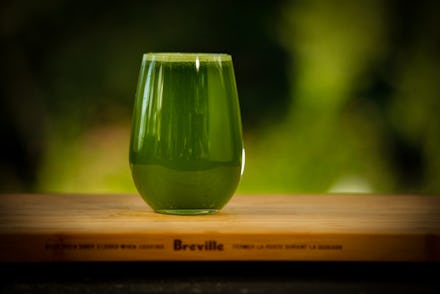These Chips Are Made From Green Juice Leftovers, So Nothing Goes to Waste

When a fruit or vegetable is thrust through a juicer, its pulp — or fiber, which is what makes the piece of produce a solid and not a liquid — is often overlooked and tossed in a compost bin, where other stringy, close-to-lifeless produce goes to die.
A juice company called Forager Project has found an innovative way to make use of the fibrous leftovers: By mixing corn-free grains, sea salt and the residual pulp, Forager produces colorful, veggie-packed, tortilla-like chips.
The result? A classic triangular chip that's sturdy enough for scooping up guacamole and salsa. The snack is the chip antithesis to those crumbly, breaks-in-your-hand kale chips that people sometimes pretend to like.
"We were pressing vegetables for our juice and had this beautiful, nutritious fiber that we were paying to be composted," company co-founder J.C. Hanley told Pressed Organic Juice Directory. "Since we are in California and are very concerned about operating a sustainable business, especially with the drought in our state, we knew there had to be a better way."
Indeed, dietary fiber is incredibly beneficial to one's health: It can contribute to better, more comfortable pooping; lower cholesterol levels; and satiate appetite, according to the Mayo Clinic.
Available in three different flavors — including "beets," "greens" and "roots" — the chips are sourced directly from Forager's own juice pulp, but the company is looking to use pulp from other juice manufacturers to keep up with demand, according to Pressed Organic Juice Directory. The products can currently be purchased online.
While, according to Hanley, many juice companies pay for their abandoned produce fiber to be lugged away and composted (good for the planet) or donate it to farms for animal feed (also good), it's possible that some of the fiber gets trashed improperly. And this is very bad news.
"Rotting food in landfills is a substantial source of methane — a greenhouse gas with 21 times the global warming potential of carbon dioxide," the Environmental Protection Agency wrote on its blog. Juice waste that isn't correctly discarded doesn't just contribute to the about 1.3 billion metric tons of food wasted in the world every year, but also to the rising temperature of the Earth's atmosphere.
In this sense, one might consider these chips a planet-saving snack. One might also consider them the perfect base for nachos.